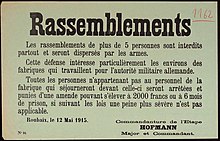Assembly ban
A meeting ban is a government, judicial or police measure that aims to prohibit a meeting .
Germany
A ban on assembly in Germany constitutes an encroachment on Article 8 (1) of the Basic Law of the Federal Republic of Germany and requires constitutional justification.
The restriction of the freedom of assembly is in turn subject to restrictions (see also barriers ). According to Section 5 of the Assembly Act, a meeting can only be prohibited in specific individual cases, a general restriction (e.g. by federal law) is not permitted.
The ban is also justified, among other things, if the organizer or leader of the meeting grants access to participants who are carrying weapons or other dangerous objects and there is a suspicion of a hostile, seditious and armed group.
In accordance with Section 15 (1) of the Assembly Act , a gathering can be prohibited even if there is a threat to public safety or order . It is almost generally recognized that the basic right according to Article 8, Paragraph 1 of the Basic Law cannot be restricted solely because of a violation of public order, since otherwise the dissemination of unpopular views could all too easily be prevented. For example, even if the majority of the population disagrees with right-wing extremist views, freedom of expression is guaranteed under the constitution.
